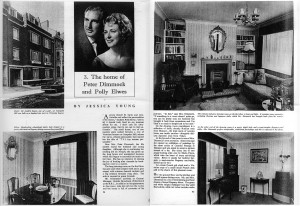When I was studying Psychology at university 20 years ago, one of my professors told me that after much consideration he had concluded that most natural phenomena and all human behaviours are cyclical. “Everything”, he said, “waxes and wanes.”
He cited the example of a driver given a ticket for speeding. Having been penalised, the driver reduces his speed in order not to get punished again. After a while, however, the driver forgets about his previous violation, and the effect of the punishment wears off. Consequently his speed begins to creep up to its previous, normal level, and before long he gets caught speeding once again. The second penalty produces the same response as the original punishment - the driver once again reduces his speed, but again only temporarily. In this way the cycle repeats itself continuously.
 An article in the most recent weekend edition of the Financial Times made me wonder if this pattern is applicable to property. In What your money can buy in Britain’s best place to live journalist Christian Dymond “finds out what is selling - and who is buying - in the Northumberland market town of Alnwick”.
An article in the most recent weekend edition of the Financial Times made me wonder if this pattern is applicable to property. In What your money can buy in Britain’s best place to live journalist Christian Dymond “finds out what is selling - and who is buying - in the Northumberland market town of Alnwick”.
The article caught my eye because last November I celebrated Thanksgiving with friends who currently live in the village of Longhoughton, Northumberland, which is less than four miles from Alnwick. At the time I was surprised to learn that Alnwick had recently been chosen as the best place to live in Britain, but the FT article confirms the story and attributes it to a recent survey in Country Life magazine (let’s simply ignore the implicit assumption that the best place to live has to be in the “country”).
History, relatively low house prices, location, local identity, a low crime rate, schooling, health care and the local farmers market all contributed to Alnwick’s pole position. Alnwick Castle, used as a location for the two Harry Potter films, has been the seat of the Dukes of Northumberland since 1309, while its £7m garden project has brought major benefits to the town.
A final, clinching attribute, said Country Life, was that Northumberland is projected to have a smaller increase in new households over the next 20 years than any other county. Until 2006, at least, the figure given by Northumberland County Council is about 700 a year. And that is in a county of 2,000 square miles, with a population of just over 300,000, the majority of whom live in the south-east corner.
So, Alnwick has been chosen as the best place to live in Britain because few people are going to live there. Alnwick is popular because it will remain unpopular - or at least relatively unpopulated, for whatever reason - in the future.
I like that circular irony very much, and if it’s true, we can predict with some confidence that Alnwick will cease being the best place to live once it has become sufficiently popular to attract lots of people. What goes around, comes around. Everything waxes and wanes.

 An acquaintance of mine, Yann Martel, won the Man Booker prize last night for his novel
An acquaintance of mine, Yann Martel, won the Man Booker prize last night for his novel 
